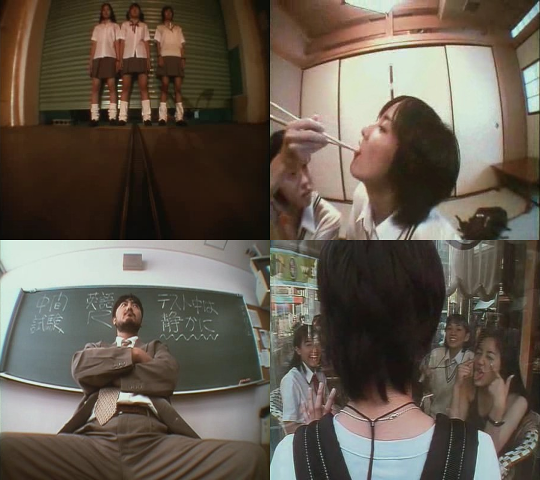Friday, June 26, 2020
Love & Pop (1998)
Love & Pop is a film about how a few aimless schoolgirls respond to escort clients. Contrary to certain beliefs, it’s not really about anything else.
Anno Hideaki’s first live-action feature, the film echoes the director’s prior experience with animated productions. The style is so striking that it almost prompts criticism for its frenetic editing and postmodernist shot-on-MiniDV camerawork. However, over the course of the film, the frenzy subsides into calm. It has the same emotional arc as most other Anno productions, something that feels authentic.

The images seem to be suggesting something.
There is a beauty to flawed characters. Even Anno’s much-beloved Neon Genesis Evangelion, in all its idealistic glory, has a way of showing people in compromising situations where they reveal their true selves. We call that the “stress test”, and no matter the character, it enhances relatability and drama.
Love & Pop is a little different from Anno’s other works in that its characters start broken before the story even begins. This puts it in the “postmodernist” category, a genre defined by jaded nihilism and a mockery of any and all ideals. Like a number of other post-1990 films, you can see handheld camerawork play its role. No longer stuck to a tripod, the camera gets right up in the characters’ faces and shows the audience what’s up.
The story begins with a group of girls having a day on the town. It’s a staple of Japanese storytelling, they seem to be having a good time, and things take a turn for the weird when they find a cell phone belonging to a mysterious businessman. What follows is an experience in Tokyo leisure culture, fueled by materialistic desire and curiosity. By the end, everyone has been thoroughly entertained.
To appreciate the relationships between people and the dominance hierarchies that keep those relationships together is to be realistic. I have met people at odds with proper society who can see past the human elements and serve the world through self-service. It’s a win-win if you can see the big picture. The characters in this film do their part in this way.
I think the ending of the film shows this. The protagonist gets home and reflects on what a wild ride she has experienced. She has gained something, her clients have gained something, and her friends who did not reach as far as her did not see as much as she did. They may not know what they missed, but at least they’re in a country where such experiences can be had.